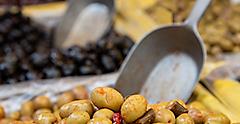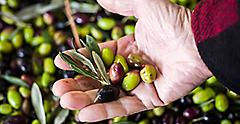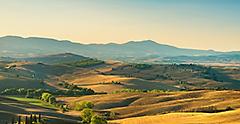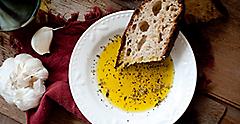
Whether you're shopping for olive oil as you travel on a food vacation in the Mediterranean to countries as wonderful as France, Spain, Italy, Greece, South Africa, or even in your hometown, my best advice is to taste it before plunking down your hard-earned dollars. Plenty of places throughout these regions will let you sample an array of the olive oils they have for sale, and for good reason — the flavor is bolder and better than what you usually find back home. In my experience, the best of it tastes like freshly cut grass and reminds me of the fields of flowers and fruits that grow nearby. You can trust your nose and your palate, too. If the olive oil is redolent of herbs and blossoms, and there's a sharp sensation in the back of your throat at the end, that's a well-made olive oil.
The Basics: What Is Olive Oil Used For?

Authentic olive oil is made by picking the olives from the trees, cleaning them, and crushing the fruit of the freshly picked whole olives into a paste, then extracting their natural oil. Producers of the best olive oil in the world only use fully ripe, undamaged olives that aren't split or cracked. There are a wide variety of different types that are used, both green and black, and most olive oils actually contain a mix. The result varies widely, from delicate, light-colored oils in golden hues with buttery almond notes to robust, powerful olive oils with bold, pungent pepper notes and an aggressively olive-flavored punch.

If you love olive oil, you're not alone. To say that olive oil has been popular for a long time is an understatement. The first olives likely grew wild in Syria, and the olive oil making process dates back as many as 6,000 years in the Mediterranean, the Middle East and Africa — regions where the hot, dry climate is good for a long olive-growing season. But this oil wasn't always produced for cooking and eating. For the first few thousands years, olive oil was made for lamp oil, and the ancient Greeks even rubbed it on themselves before the first Olympics.

Today, olive oil is used as a cooking staple in many regions of the world. In the Mediterranean, where olive oil can be as precious as wine, you can find olive oils made not only from one type of olive — such as picholine in Provence and frantoio in Tuscany — but also from olives from a single field. The olives themselves can be picked the old-fashioned way by hand, using a stick to knock them off the top branches of the trees, or by modern machinery. The oil is then processed in a special mill, which in France is called a moulin and often pictured on the bottle. While the oil used to be pressed out between mats spread with the paste, most oil today is extracted by a centrifuge.

Some regions are well known for a certain flavor profile. In Italy, the five olive-growing regions — Tuscany, Liguria, Puglia, Umbria, and Sicily — all offer different flavor profiles. Umbria's oil, for example, is often described as having artichoke and nutty tones.
Freshness Makes A Big Difference
The top olive oil producers pick the olives and then immediately bring them to a mill to be processed. One even told me they press the olives within three hours of harvesting them! The longer olives sit around once they're picked, the lower the quality. Big commercial olive oil companies use machines to harvest, and typically the mill can't handle the quantity as quickly as the mechanical harvesters can get them down from the trees, so the olives aren't quite as fresh.

That's why the handmade olive oil sold by the farmer in the open-air market in France — the ones in rougher looking bottles — are often of significantly higher quality compared with the more polished looking bottles you find in your grocery store at home. In addition, look for olive oils created by vineyards in the Mediterranean and California that are well known for their wines. Chances are, they take just as much pride in what they produce on their olive farm, as well.
Unlike wine, age never improves the taste or quality of olive oil at any stage of the process, so knowing how to pick the freshest olive oil is key. Look for olive oils in darker bottles, because sunlight can impact the oil over time, and be sure to read the labels carefully for expiration dates. Olive oil can start to turn rancid in as little as 18 months, at which point it will start to taste notably off. Regardless of how attractive the bottles are, you'll want to store your olive oils in a pantry, away from your stove, other heat sources and sunlight.
In addition, be sure to use your high-quality olive oil quickly once you open it rather than doling out a precious few dribbles at a time on special occasions. If you wait too long, the flavor will deteriorate, and you'll miss the perfect window to use most of the bottle. Instead, whip up a batch of vinaigrette whenever you're making a salad, mix your oil into a spectacular pesto, and put a little plate of olive oil on the table every time you set out a freshly baked bread. There are even certain types of olive oil for skin care, so find one you like and try it as a moisturizer!
I made the mistake once of hoarding a precious bottle purchased from a tiny port town in France. I was saving it for the ideal moment and then watched in horror as a house guest accidentally knocked it into the sink, pouring most of it down the drain. The moral of the story: Accidents happen, so use your gorgeous olive oil souvenir to make as many delicious meals as you possibly can.
First Press Vs. Cold Press Vs. Virgin Vs. Refined Oil

As you approach market shelves heaving with the weight of the choices, you may find that the options are daunting. The truth is there are so many different types of olive oil. What's the difference between cold press and extra virgin? First press? Most importantly, what's the choice that's going to make your eyes light up when you try to recreate that ratatouille you just had for lunch for your next dinner party?
While processing olive oils at a higher heat means you get more oil out of the batch, it can also mean that the olive oil can get slightly cooked, which is not ideal. But the term "cold" isn't really literal these days — generally, a low amount of heat is applied in the process, but "cold pressed" does mean that the oil hasn't been processed or pasteurized and it's closer to its original flavor.
First press olive oil means it was only pressed once. Virgin olive oils are ones that have been pressed without chemicals, while refined olive oils are ones that have used chemicals in the process. Refined oils are the ones with the highest smoke points, so if you want to fry something until it crackles in olive oil, go for those.
When you're shopping for olive oil, you'll likely see beautiful bottles with citruses, garlic, truffles, peppers or herbs inside. However, you may want to avoid purchasing a bottle mixed with these additions since some large companies make these blends to mask the otherwise poor taste of lower-quality oils. It's easy enough to add these enticing-sounding additions on your own while cooking, so it's best to just avoid them.
Most French and Italian families keep at least two types of olive oil in their cabinets — one to cook with and another to drizzle on top of dishes at the end of cooking as a finisher. The reason is simple: The most expensive extra virgin olive oils are wasted if you cook with them because they have a low smoke point. This means if the heat gets too high, they can easily scorch and become bitter. So, it's best to do as those with a Mediterranean diet do and save your pricey extra virgin olive oil as a topper for impressive pastas, unforgettable salads or delicious bread appetizers.

If you are a less accomplished home cook, or you just don't use olive oil often enough in dishes to justify keeping multiple bottles open in your pantry, look for a mid-priced work horse of a bottle that's not too precious to cook with, like many Spaniards — who fry a lot of different tapas in olive oil — might do. That means you can still shop for a small bottle of olive oil here and there when you travel, and not just as presents for friends and family members.
Showcasing Your Olive Oil

Be sure to use your luscious oil in decidedly olive-oil-forward recipes that will showcase the oil well — ideally from the region you bought them in. Some of my favorites include dishes such as a Provençal Niçoise salad with tuna and eggs, a pan Bagnat (the sandwich version of the dish) or a lovely ratatouille of roasted vegetables that were brushed with olive oil and grilled. For dishes from Spain, I love Catalan ham croquettes fried to a crisp on olive oil, or fish slowly poached in a gentle bath of olive oil. For Italian dishes, consider Ligurian focaccia studded with olives or cherry tomatoes and served with dipping oil, or a plate of tomato-studded caprese salad sprinkled with elegant sea salt and basil. I also love Calabrian spaghetti tossed in a simple but pungent garlic and olive oil preparation, or a rich Tuscan Panzanella salad of tomato, stale bread and basil tossed in an olive oil dressing. From Greece, it's hard to beat the freshness of a salad topped with cucumbers, tomato and feta drizzled with unforgettably good olive oil. You can even use your treasured find in Italian desserts that highlight this staple ingredient, like a lemony olive oil cake that's moist and tender or fragrant olive oil gelato.
All these choices will transport you right back to the Mediterranean from the comfort of your kitchen, but I suggest pairing the meal with a beautiful bottle of wine from the same area as well for added authenticity and a true taste of terroir. Whatever menu you decide to use the oil in, and whatever region's cuisine you choose to celebrate, you'll be glad you took the time to seek out a special olive oil for the occasion of feasting on the flavors of your vacation.
For olive oil lovers, there's no better shopping trip than a Mediterranean cruise.
Get Royal Deals, Sign Up Today

Getting There
Explore Our Most Affordable Itineraries
For olive oil lovers, there's no better shopping trip than a Mediterranean cruise.




